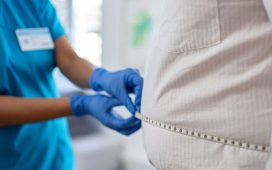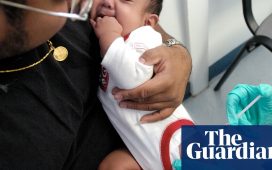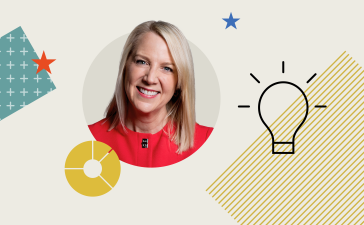A woman was diagnosed with one of the rarest pregnancies in the world after discovering one of her “twins” was actually a tissue which can develop into cancer. Lara Eastwood, 36, found out she was pregnant with twins at just six weeks along.
She was given the devastating news she had lost one of them at her eight-week scan.
But at 12 weeks Lara and her fiancé, Daniel Turner, 43, were told the dead foetus hadn’t dissolved.
She was experiencing a twin molar pregnancy – when there is a problem with the fertilised egg which means the baby and placenta do not develop in the way they should.
Lara was told she should terminate but her nurse’s intuition kicked in and she fought for a second opinion.
She was then diagnosed with a partial molar pregnancy with a co-existing twin – where the egg is fertilised by two sperm which results in three sets of chromosomes instead of the usual two.
Her doctor told her there are just 44 cases in the world. Lara decided to continue with her pregnancy – despite the risk that the tissue from the dead placenta can develop into cancer.
Now 36 weeks along, Lara won’t know whether she or her baby are impacted until the birth.
Lara, a nurse, from Nottingham, said: “If I hadn’t been medical and hadn’t looked after patients with molar I think I would have made the decision to terminate. It was only because of my stubbornness and my instinct. Hopefully I’ll get a healthy baby and it will all be worth it.”
Lara and Daniel were excited when they found out they were expecting twins in February this year – after already suffering three losses.
Lara started to experience bleeding and pain but her scans continued to look fine and showed two heartbeats.
The couple – who have a son Oliver, three, together – went for their eight-week scan just after Easter and were told one of their twins had passed away.
Lara said: “I was grieving the one that was gone. I didn’t want to eat. But I was very conscious that you can’t not eat because you’ve got another one.It was such a conflict of emotions.”
At 12 weeks along, Lara went for another scan ready to try and put the loss behind her and focus on growing her remaining baby.
She said: “I went into the room and knew something was wrong straight away. I heard the word molar thrown around.
“The dead one was still there – it hadn’t been dissolved. I knew what that potentially meant.”
Lara knew about molar pregnancies from her experience as a nurse.
She was given three options – to terminate the very next day, medically terminate in a week or “bury her head in the sand”.
Lara wanted a second opinion as she didn’t want to terminate her pregnancy – having now experienced four losses.
The next week she had a call from the doctor who told her it was a twin molar pregnancy.
Lara said: “I said ‘it can’t be – mine had a heartbeat’. Molar pregnancies – it just looks like a cell. It looks like a mass of tissue. Mine looked like a baby.”
But a procedure in May confirmed the diagnosis. Usually the placenta would be removed and sent off for testing but as Lara was still carrying a live baby her case was more complicated.
She said: “I have got endometriosis. In five pregnancies I have lost four babies. I asked ‘is there a chance I can continue?’ – he said yes.
“It was my decision to carry on and put myself at risk.
“I can live with myself if this baby doesn’t make it. I’ve given it the best possible chance to get here.”
Lara has been monitored closely and is now nearly at 36 weeks – but she still hasn’t bought anything for the baby.
She said: “We don’t know if this baby is going to have anything wrong with it. Until I deliver I won’t know.
“It’s been the most horrendous pregnancy. I feel totally robbed.”
Lara may be able to deliver naturally as her baby is at the bottom and has moved the dead placenta to the side.
After giving birth the placentas will be sent off to a specialist centre to be tested.
Lara will also be monitored with urine and blood checks to see if she has any signs of cancer. If there is, she would then need chemotherapy for four to six months.
Now Lara hopes to raise awareness of the rare pregnancy so others can understand it.
She added: “I wanted people to know [about her loss] but I didn’t want to tell everyone.”











